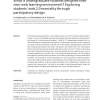Free Online Productivity Tools
i2Speak
i2Symbol
i2OCR
iTex2Img
iWeb2Print
iWeb2Shot
i2Type
iPdf2Split
iPdf2Merge
i2Bopomofo
i2Arabic
i2Style
i2Image
i2PDF
iLatex2Rtf
Sci2ools
JCAL
2011
2011
What if undergraduate students designed their own web learning environment? Exploring students' web 2.0 mentality through partic
Following the increasing calls for a more skeptical analysis of web 2.0 and the empowerment of learners’ voices in formulating upcoming technologies, this paper elaborates on the participatory design of a web learning environment. A total of 117 undergraduate students from two Greek Informatics Departments participated in 25 participatory design sessions, employing two needs’ elicitation techniques, with the aim of envisioning a learning platform that meets their learning particularities and needs, incorporates and exploits their new technological habits, and can be harmoniously situated in their daily routine. Overall, 773 needs were elicited, proving that students had refined views about the elements that can render the next wave of e-learning applications successful. They convincingly demonstrated their web 2.0 mentality but sought for a smooth transition to the new environment, promoting an evolution rather than a revolution. The resulting set of needs demarcates a zone of exp...
| Added | 15 Sep 2011 |
| Updated | 15 Sep 2011 |
| Type | Journal |
| Year | 2011 |
| Where | JCAL |
| Authors | George Palaigeorgiou, George Triantafyllakos, Avgoustos A. Tsinakos |
Comments (0)

